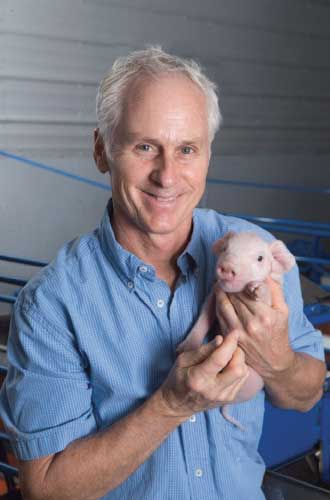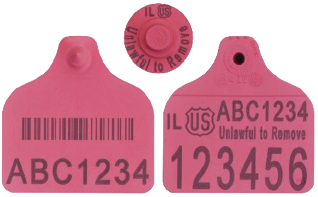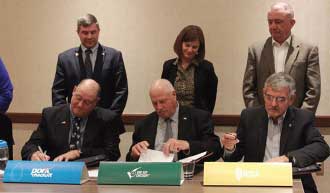In this Pork Checkoff-funded study, researchers set out to test the efficacy of commercial disinfectants against foreign animal disease (FAD) viruses dried in swine products and on surfaces found in packing plants. An additional goal was to test a less-pathogenic domestic virus as a potential substitute for the foot-and-mouth disease virus (FMDv), which would allow testing outside high-containment laboratories.
Two commonly used disinfectants, CD631 (acid quaternary ammonium-based) and XY12 (sodium hypochlorite-based), were tested against FMDv, classical swine fever virus, and African swine fever virus. Virus-contaminated swine products (blood, meat juice, and feces) dried onto typical packing plant surfaces (stainless steel, plastic, and concrete) were tested. Researchers found both disinfectants were highly effective when the FAD viruses were dried without organic material on steel and plastic surfaces. Both disinfectants were less effective when FAD viruses were dried in meat juice and blood.
Contaminated swine feces dried on various surfaces could be rapidly disinfected with CD631 and citric acid, however feces strongly inhibited the efficacy of XY12 (sodium hypochlorite-based) disinfectant and bleach. Concrete disinfection was a challenge, but after extensive testing it was determined that commercially sealed concrete had better results. Viruses dried on sealed concrete were inactivated similarly as on the plastic and steel surfaces. Equine rhinitis A virus (ERAv) was used as an FMDv surrogate and responded similarly to CD631 and citric acid disinfectants. However, ERAv was more sensitive than FMDv to disinfection by XY12 and bleach products and was not a good surrogate, thereby continuing the search for a substitute.
Researchers concluded that acid-based commercial disinfectants such as CD631, used under manufacturer’s instructions, are appropriate for disinfection during a FAD virus outbreak. However, surface pre-cleaning steps prior to disinfection are necessary when dry blood products or meat juices are present on surfaces. The hypochlorite-based product (XY12) tested was ineffective at inactivating FAD viruses in the presence of organic material. For more information, go to www.pork.org/research. For a list of EPA-approved disinfectants, go to: www.aphis.usda.gov/animal_health/emergency_management/downloads/fad_epa_disinfectants.pdf.
 Illinois farmer named America’s Pig Farmer of the Year
Illinois farmer named America’s Pig Farmer of the Year
Patrick Bane, a pig farmer from Arrowsmith, Illinois, has been named the 2018 America’s Pig Farmer of the Year by achieving the highest combined score from a third-party judging panel and online voting. The award recognizes a pig farmer who excels at raising pigs using the We Care ethical principles and who connects with today’s consumers about how pork is produced.
“We are pleased to have Patrick represent America’s pig farmers. He embodies the very best in pig farming,” said Steve Rommereim, National Pork Board president and a pig farmer from Alcester, South Dakota. “It’s important that we tell today’s consumers how we raise their food in an ethical and transparent way. Patrick’s interest in sharing his farm’s story, as well as putting a face on today’s pig farming, will help us reach this goal.”
Raising pigs has been a life-long passion for Bane, whose family has been raising pigs for three generations. Bane raises 74,000 pigs on his farm in central Illinois, where he focuses on protecting public health, hiring the best people and maintaining herd health.
“It’s our responsibility to show the public that we are doing the right things to care for our animals and keep them healthy,” Bane said. “We need to foster an increased understanding about how food is raised using today’s modern technology. It’s not only good for us as farmers, but it’s good for consumers. You can’t drive that point home enough. We have a lot of good, positive stories to share.”
To learn more about the program or to nominate someone for the 2019 award, go to www.americaspigfarmer.com.
Improving the performance of porcine reproductive and respiratory syndrome virus oral fluid diagnostics
It is widely accepted that the porcine reproductive and respiratory syndrome virus (PRRSv) can be monitored in swine populations more conveniently, efficiently, and cheaply using oral fluid specimens as compared to surveillance based on testing individual pig serum samples. Oral fluids are a convenient sample to collect, but are often heavily contaminated with feed, feces, and inorganic environmental debris. Attempts to “clean up” samples by centrifugation or filtration have not been effective.
To address this issue, a coagulant formulation that is compatible (does not interfere or inhibit test performance) with antibody and polymerase chain reaction (PCR)-based testing has been identified. Preliminary results indicate that this formulation could also assist in:
- Cleaning-up and removing particulates from oral fluid samples
- Improving the sample handling characteristics (pipetting) of the sample
- Antibody detection
- Ribonucleic acid detection
- Field application
The goal of this research was to provide a more effective, efficient, inexpensive method of surveillance for prevention, control, or elimination of PRRSv and other economically significant infectious agents affecting the US swine herd.
Researcher: Luis Rodriguez, USDA, Agricultural Research Service, Plum Island Animal Disease Center.
To learn more, go to www.pork.org/research.
 Got your premises identification number? It’s critical for foreign animal disease preparation
Got your premises identification number? It’s critical for foreign animal disease preparation
If you don’t have a premises identification number (PIN) for every location where you or your clients raise pigs, you need to do so if you want to be fully prepared for a foreign animal disease (FAD). The first step for getting a PIN is to contact your state animal health official’s office and talk to the identification program coordinator.
When you are preparing to call your state’s identification program coordinator to get your PIN, be prepared to provide the following information for each site:
- Name of entity or company
- Contact information for the owner or other appropriate individual
• Type of operation
- Street address, city, state and ZIP code
- Telephone number
- Some states have an optional category for latitude and longitude numbers
- Most states request the species of livestock on the site
It is important to note that the number of livestock present on the site is not required. The information gathered at the federal level for premises registration is only intended to identify that livestock are present and not the number of animals of each species.
To verify an existing PIN, use the Checkoff’s Premises Verification Tool at lms.pork.org/premises.
For more information, contact Dr Patrick Webb at pwebb@pork.org or 515-223-3441.

Commodity Leaders Join Forces on Sustainability Research
The National Pork Board, United Soybean Board, and National Corn Growers Association recently signed a memorandum of understanding on a sustainability research platform that will benefit all three organizations and their producers. This research program will include the sharing of completed research, coordination on current and planned research, and define ways to share and communicate results with each organization’s members.
Leadership from the three commodity groups agree that it is prudent to consider specific ways in which they might work together more effectively to ensure alignment and collaboration in sustainability research and how the results can and will be communicated and shared.
“Sustainability is defined by the We Care ethical principles pork producers established over 10 years ago,” said National Pork Board President Steve Rommereim, a pig farmer from Alcester, South Dakota. “Joining in the efforts of two other organizations, as a collective group we can more effectively spend producer dollars to achieve the goals we can all believe in and support. Without one, we wouldn’t have the other.”
For more information, contact Brett Kaysen at bkaysen@pork.org or 515-223-2600.
